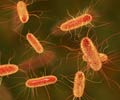Scientists have found that people employed in chimpanzee-focused research and tourism in a park in western Uganda are exchanging gastrointestinal bacteria – specifically E. coli.
Scientists from the University of Illinois at Champaign-Urbana have found that people employed in chimpanzee-focused research and tourism in a park in western Uganda are exchanging gastrointestinal bacteria – specifically Escherichia coli – with local chimpanzee populations. And some of the E. coli strains migrating to chimps are resistant to antibiotics used by humans in Uganda.
Other studies have found bacterial exchanges between humans and non-human primates – particularly in areas where the animals are known to frequent garbage piles near human settlements. But this is the first study to document the exchange of E. coli between humans and chimps in a protected wildlife area. It is also the first to find antibiotic-resistant strains in chimpanzees in Africa.“Antibiotic resistance has traditionally been associated with two factors: indiscriminate and over-prescription of antibiotics by physicians in the developed world and the inclusion of antibiotics in animal feed in the developed world,” said Tony L. Goldberg, a professor of veterinary pathobiology and the principal investigator of the study. The new findings, Goldberg said, show that over-the-counter sales of antibiotics for human consumption can also have an impact on wildlife.
The research team, which included researchers from Makerere University in Kampala, Uganda, and McGill University in Montreal, examined two of 10 known communities of chimpanzees living in Kibale National Park, Uganda. One of the two chimp groups has been the focus of two decades of research by international teams of scientists. The other is regularly visited by employees of a local tourism venture.
Goldberg’s team compared strains of E. coli in the chimps to those of the Ugandans employed in research and tourism in the park.
The team also analyzed samples from people living in a village 5 kilometers from the research site and 25 kilometers from the tourism station. People in the village had no known contact with the chimps.
The team collected 250 E. coli isolates from 25 humans and 23 chimpanzees. Of these, 89 unique genotypes (strains) of E. coli were found.
Advertisement
“This expands our notion of the situations in which people and chimps can exchange microbes,” Goldberg said. “Habitat overlap, even without direct contact between people and primates, is sufficient for the exchange to occur.”
Advertisement
Goldberg said it was not clear whether the exchange of bacteria was the result of direct or indirect (environmental) association between the chimps and humans working in the park. Both make use of local streams and other environmental features.
Regardless of the route of transmission, it places both at risk, Goldberg said.
“We’re as concerned about potential effects on human health as on animal health,” he said.
He noted that the exchange of microbes between non-human primates and humans is not new. Two deadly viruses, HIV and Ebola, are believed to be linked to chimpanzees and other non-human primates. Human diseases also pass to monkeys and apes, with equally dire consequences: Pneumonia, respiratory disease, scabies and a polio-like virus have caused epidemic mortality in chimpanzees in some African locales.
Source-Bio-Bio Technology
SRM









